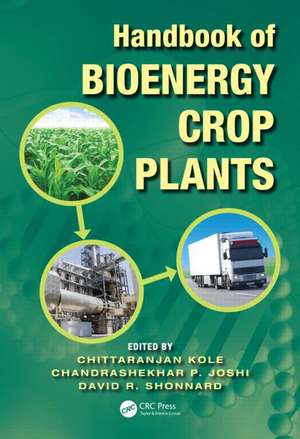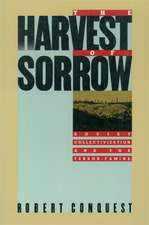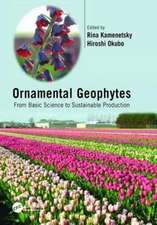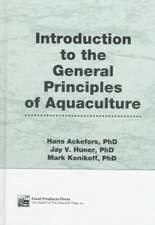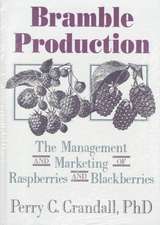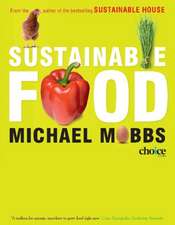Handbook of Bioenergy Crop Plants
Editat de Chittaranjan Kole, Chandrashekhar P. Joshi, David R. Shonnarden Limba Engleză Hardback – 22 mar 2012
Section One explores the genetic improvement of bioenergy crops, ecological issues and biodiversity, feedstock logistics and enzymatic cell wall degradation to produce biofuels, and process technologies of liquid transportation fuels production. It also reviews international standards for fuel quality, unique issues of biofuel-powered engines, life-cycle environmental impacts of biofuels compared with fossil fuels, and social concerns.
Section Two examines commercialized bioenergy crops, including cassava, Jatropha, forest trees, maize, oil palm, oilseed Brassicas, sorghum, soybean, sugarcane, and switchgrass.
Section Three profiles emerging crops such as Brachypodium, diesel trees, minor oilseeds, lower plants, Paulownia, shrub willow, sugarbeet, sunflower, and sweet potato. It also discusses unconventional biomass resources such as vegetable oils, organic waste, and municipal sludge.
Highlighting the special requirements, major achievements, and unresolved concerns in bioenergy production from crop plants, the book is destined to lead to future discoveries related to the use of plants for bioenergy production. It will assist in developing innovative ways of ameliorating energy problems on the horizon.
| Toate formatele și edițiile | Preț | Express |
|---|---|---|
| Paperback (1) | 531.31 lei 6-8 săpt. | |
| CRC Press – 18 oct 2019 | 531.31 lei 6-8 săpt. | |
| Hardback (1) | 1643.49 lei 6-8 săpt. | |
| CRC Press – 22 mar 2012 | 1643.49 lei 6-8 săpt. |
Preț: 1643.49 lei
Preț vechi: 2004.26 lei
-18% Nou
Puncte Express: 2465
Preț estimativ în valută:
314.52€ • 327.15$ • 259.66£
314.52€ • 327.15$ • 259.66£
Carte tipărită la comandă
Livrare economică 15-29 aprilie
Preluare comenzi: 021 569.72.76
Specificații
ISBN-13: 9781439816844
ISBN-10: 1439816840
Pagini: 874
Ilustrații: 160 b/w images, 132 tables and 6
Dimensiuni: 178 x 254 x 53 mm
Greutate: 1.72 kg
Ediția:New.
Editura: CRC Press
Colecția CRC Press
ISBN-10: 1439816840
Pagini: 874
Ilustrații: 160 b/w images, 132 tables and 6
Dimensiuni: 178 x 254 x 53 mm
Greutate: 1.72 kg
Ediția:New.
Editura: CRC Press
Colecția CRC Press
Public țintă
Academic and Professional ReferenceCuprins
Section I. Conventional and Molecular Breeding for Improvement of Biofuel Crops: Past, Present, and Future. Genomics for Bioenergy Production. Genetic Engineering for Bioenergy Crops. In Planta Production of Cell Wall Degrading Enzymes. From Plant Cell Walls to Biofuels—Arabidopsis thaliana Model. Ecologically Sustainable Bioenergy Communities: Species Selection and Habitat Considerations. Biomass Harvest and Logistics. Chemical Engineering for Bioenergy Plants: Concepts and Strategies. International Fuel Quality. Biofuel Use from Bioenergy Crops: Internal Combustion Engines in Transportation. Life-Cycle Energy and Greenhouse Gas Impacts of Biofuels and Biomass Electricity. Public Policies, Economics, Public Perceptions, and the Future of Bioenergy Crops. Section II. Cassava. Jatropha. Forest Trees. Maize. Oil Palm. Oilseed Brassicas. Sorghum. Soybean.Sugarcane. Switchgrass. Section III. Brachypodium. Diesel Trees. Minor Seed Oils. Lower Plants. Paulownia. Shrub Willow. Sugarbeet. Sunflower. Sweetpotato. Organic Farm Waste and Municipal Sludge. Vegetable Oils. Index.
Notă biografică
Professor Chittaranjan Kole, Director of Research of the Institute of Nutraceutical Research at the Clemson University, is an internationally renowned scientist with over 27 years of experience in teaching and research on plant genetics, genomics, and biotechnology. He has guided 30 research students and published more than 140 research articles, most of which appeared in the leading peer-reviewed journals and proceedings of international meetings. Several of his pioneering contributions, particularly on molecular evolution of flowering time, stress-related and highly repetitive genes, have paved the way for several new avenues for fellow scientists. His scientific contributions and edited books have been appreciated by several leading scientists including seven Nobel Laureates.
Professor Chandrashekhar Joshi is a plant molecular geneticist in the School of Forest Resources and Environmental Science (SFRES) at the Michigan Technological University. He has 30 years of research experience in plant molecular biology. His current research focuses on wood cell wall development in bioenergy trees, with particular emphasis on unraveling the process of cellulose synthesis for improved bioenergy production. He teaches courses in genomics, molecular genetics, bioinformatics, and grantsmanship. He has authored over 160 publications and presentations, four patents and two books.
Professor David Shonnard has been on the faculty in the Department of Chemical Engineering at Michigan Technological Universitysince 1993. His current research interests focus on investigations of new forest-based biorefinery processes for production of transportation fuels (such as cellulosic ethanol) from woody biomass using recombinant DNA approaches. Another active research area is life-cycle assessment (LCA) of biofuels and other biorefinery products to determine greenhouse gas emissions and net energy balance
Professor Chandrashekhar Joshi is a plant molecular geneticist in the School of Forest Resources and Environmental Science (SFRES) at the Michigan Technological University. He has 30 years of research experience in plant molecular biology. His current research focuses on wood cell wall development in bioenergy trees, with particular emphasis on unraveling the process of cellulose synthesis for improved bioenergy production. He teaches courses in genomics, molecular genetics, bioinformatics, and grantsmanship. He has authored over 160 publications and presentations, four patents and two books.
Professor David Shonnard has been on the faculty in the Department of Chemical Engineering at Michigan Technological Universitysince 1993. His current research interests focus on investigations of new forest-based biorefinery processes for production of transportation fuels (such as cellulosic ethanol) from woody biomass using recombinant DNA approaches. Another active research area is life-cycle assessment (LCA) of biofuels and other biorefinery products to determine greenhouse gas emissions and net energy balance
Descriere
Devastating fossil fuel shortages loom in the future unless more renewable alternatives to energy are developed. This volume surveys the possibilities and challenges involved in biofuel production. The book explores the genetic improvement of bioenergy crops, ecological issues and biodiversity, feedstock logistics and enzymatic cell wall degradation to produce biofuels, and process technologies of liquid transportation fuels production. It also reviews international standards for fuel quality, issues related to biofuel-powered engines, life-cycle environmental impacts of biofuels compared with fossil fuels, and social concerns. The final sections profile a range of crops.
